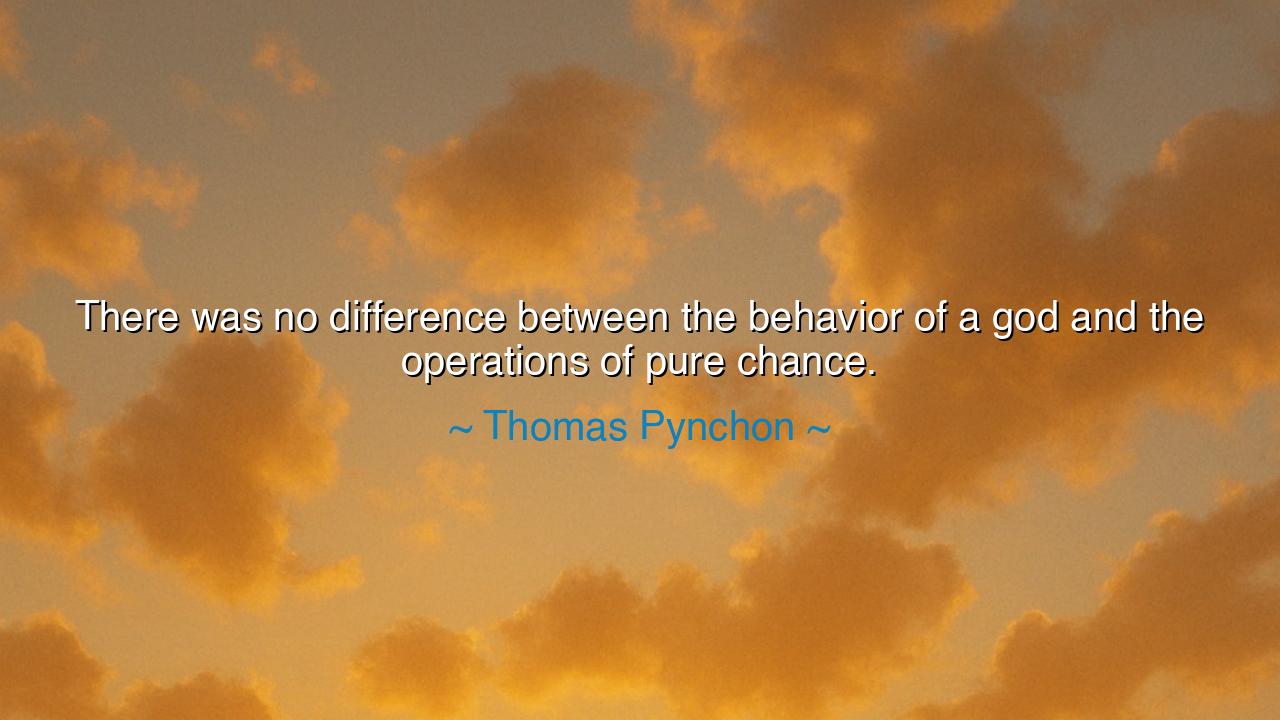
There was no difference between the behavior of a god and the
There was no difference between the behavior of a god and the operations of pure chance.






In the words of Thomas Pynchon, "There was no difference between the behavior of a god and the operations of pure chance," we are thrust into the deep waters of philosophical inquiry—the age-old struggle between the forces of fate, free will, and the existence of divine intervention. Pynchon’s statement touches on a fundamental question of existence: are the events that shape our lives guided by the hand of a higher power, or are they mere accidents, shaped by chance? In this profound reflection, Pynchon asks us to question the very nature of control in our lives, the illusion of purpose, and whether we are truly at the mercy of forces beyond our understanding, or whether our lives are shaped simply by the randomness of the universe.
The ancient Greeks wrestled with similar questions, especially in the works of Sophocles and Heraclitus, who explored the interplay between destiny and chance. In Sophocles’ tragedies, fate often appears as an unavoidable force, dictating the lives of even the most heroic figures. Yet, in the works of Heraclitus, the idea of the Logos, a rational principle that governs the universe, suggests that chaos is not random but governed by a deeper order. Just as Pynchon blends the ideas of gods and chance, the ancients grappled with the tension between the divine and the natural order, questioning whether there is a hidden rationality behind what seems like pure randomness. The gods in Greek mythology often embody this paradox—appearing to control fate, yet behaving with the capriciousness and unpredictability of chance itself.
Consider the story of Oedipus, the tragic hero of Sophocles’ Oedipus Rex, whose life was shaped by an inescapable prophecy. His actions, seemingly guided by free will, led him directly into the fulfillment of the prophecy he sought to avoid, illustrating the intersection of fate and personal choice. Oedipus believed that by making his own decisions, he could defy the gods’ will, but in doing so, he unknowingly marched directly into the hands of destiny, much like a random event playing out without his control. Pynchon’s words remind us of this paradox, where the seemingly random and the divine are often indistinguishable, suggesting that perhaps there is no difference between divine will and the chaotic randomness of life.
Pynchon’s idea also evokes the ancient concept of chance and randomness as foundational elements of existence. The Stoics, such as Epictetus and Marcus Aurelius, believed that while the universe may seem chaotic and beyond our control, our reactions to it are what shape our lives. According to Stoic thought, the universe is governed by logos, a rational principle, but it is impervious to human will. In this sense, chance is simply the appearance of random events, which, in truth, are part of a larger, rational cosmic order. The Stoics taught that we must accept the randomness of life’s events and focus on how we respond to them, finding peace through acceptance of life’s inherent unpredictability.
In contrast, Pynchon’s suggestion that the behavior of gods and chance are indistinguishable challenges the belief in a higher purpose behind these random events. If the gods, who were once seen as controllers of fate, now appear as actors governed by chance, then perhaps the divine is no longer the source of order in the universe. Instead, what we once attributed to divine will might simply be the natural unfolding of events driven by randomness. This idea brings us face to face with the void—the uncertainty of existence, where no cosmic meaning or higher purpose may be at play, and the universe itself is driven by an inherent chaos.
Pynchon’s words also touch on the human condition and our need for meaning in a world that often feels chaotic and random. The ancient philosophers and storytellers tried to provide us with the comfort of divine order, but modern writers like Pynchon challenge this view by suggesting that perhaps the universe is indifferent to our suffering, joy, and choices. The idea that gods and chance are the same asks us to embrace the possibility that life is less about following a predestined path and more about accepting the randomness of events, while finding meaning in our own actions and choices. This philosophical tension forces us to reconsider our role in a world that may not have any inherent meaning beyond what we create for ourselves.
The lesson in Pynchon’s quote is profound: life is both unpredictable and yet full of possibility. While we may never know whether the events in our lives are guided by divine forces or pure chance, we must accept that uncertainty is a central aspect of the human experience. Just as the ancients sought to understand the relationship between fate and free will, so too must we grapple with the randomness of life’s outcomes. Instead of seeking certainty, we are called to find meaning in the choices we make and to embrace the unpredictable nature of existence. It is in this acceptance of randomness, and the power we have to create meaning within it, that we find true freedom.
Thus, we must live with the awareness that life’s unpredictability does not render it meaningless. Instead, it offers us the opportunity to shape our own destiny, to live authentically in the face of chaos, and to find peace in accepting the randomness of the universe. Like the heroes of ancient myth who navigated fate with courage and resilience, we too must navigate the vast, unpredictable world with wisdom, knowing that while the universe may be indifferent, our choices are what give life meaning.






AAdministratorAdministrator
Welcome, honored guests. Please leave a comment, we will respond soon